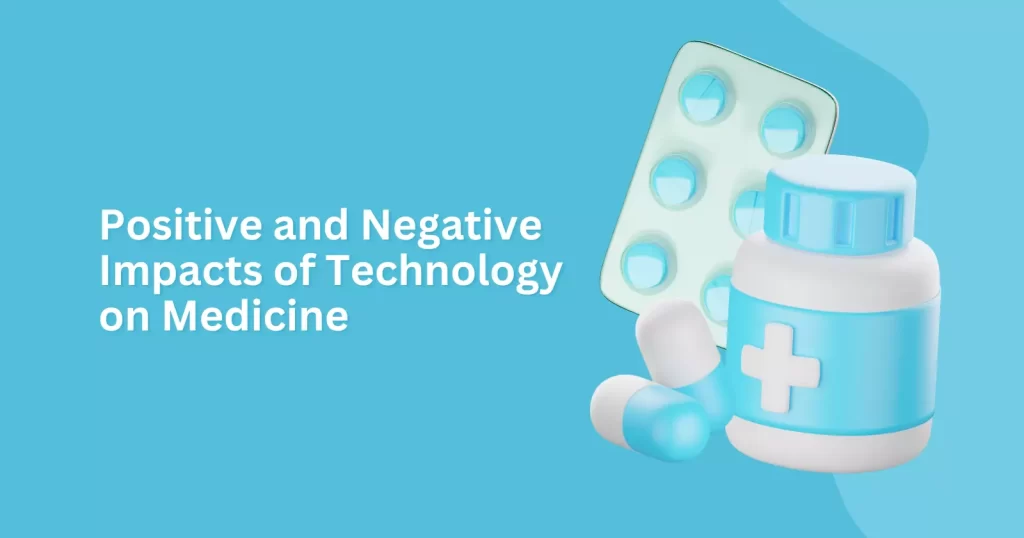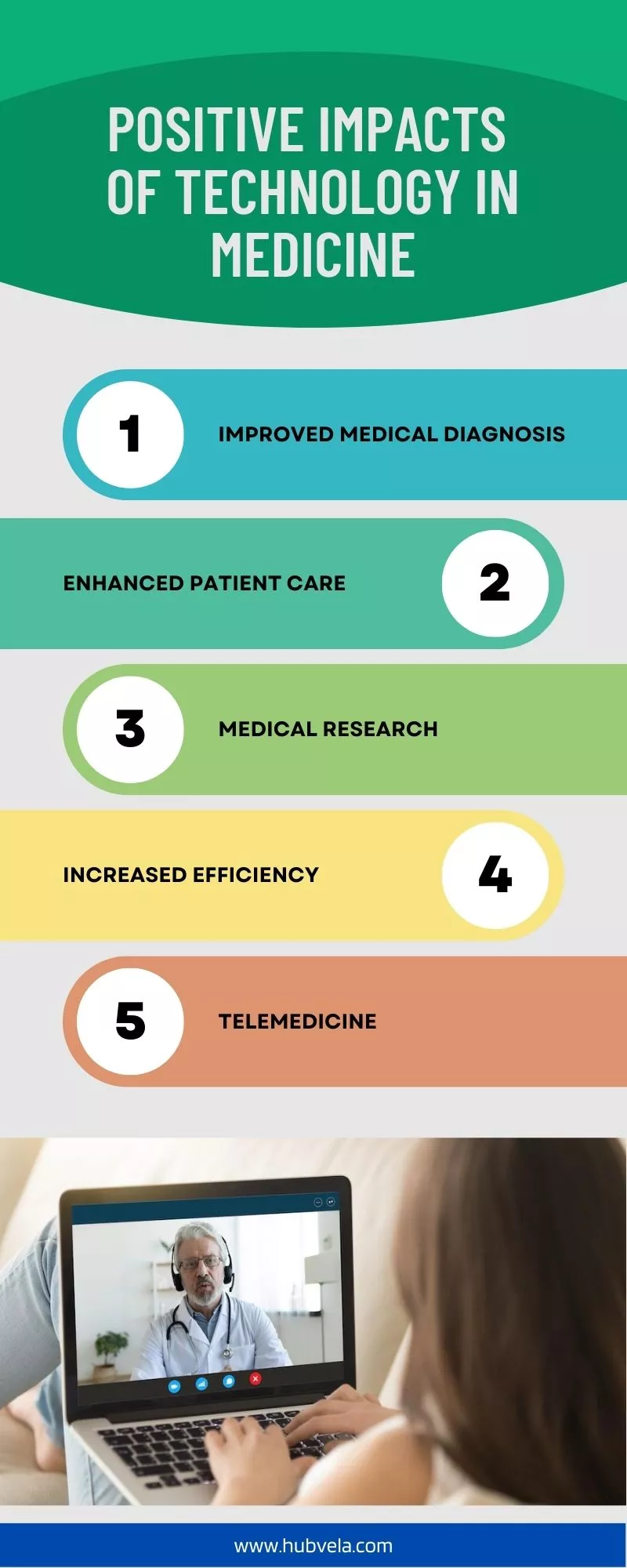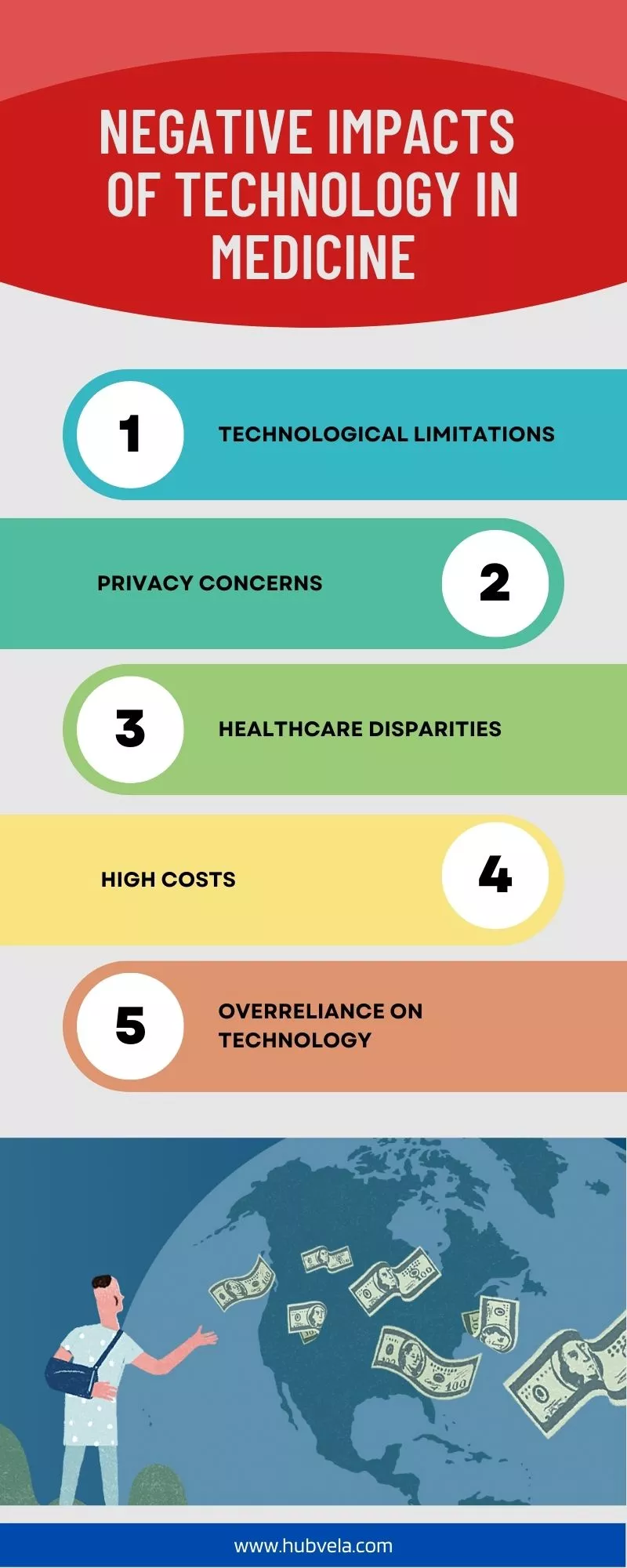Technology has revolutionized the field of medicine, bringing about both positive and negative impacts.
From electronic health records to telemedicine, technology has transformed how healthcare is delivered and managed.
However, with these advancements come concerns about privacy, security, and the potential for technology to replace human interaction in healthcare.
In this article, we will explore the positive and negative impacts of technology on medicine.

--Advertisement--
Positive Impacts of Technology on Medicine
Technology has revolutionized the way we live our lives, and the field of medicine is no exception.
From advanced medical equipment to innovative treatments, technology has brought about numerous positive impacts in the healthcare industry.
We will explore some of the positive impacts of technology on medicine.

1. Improved Medical Diagnosis
The positive impacts of technology on medicine are numerous, and one of the most significant is the improvement in medical diagnosis.
With the help of electronic health records (EHRs) and artificial intelligence (AI), healthcare providers can access complete and accurate information, leading to better patient outcomes.
Additionally, improving diagnosis education can help reduce diagnostic errors, which are all too common in medical practice.
Communication is also key in improving patient safety, including during diagnosis and treatment.
Mobile devices in the hands of healthcare practitioners also allow for immediate access to medical information, improving patient diagnosis and treatment.
With these advancements, we can expect to see continued improvements in medical diagnosis and ultimately better patient outcomes.
2. Enhanced Patient Care
Technology has had a significant positive impact on patient care in medicine. With the integration of technology, healthcare providers can now offer enhanced patient care.
From automated IV pumps to nursing informatics, technology has revolutionized the way healthcare providers deliver care to patients.
By analyzing data, healthcare providers can identify areas that need improvement and create opportunities for staff support and development.
Effective communication with patients is also essential for shared decision-making and patient-centered care.
While digital capabilities are necessary, it is important to recognize that the consumer experience is more than technology.
With the right balance of technology and patient care, healthcare providers can offer a superb patient experience.
3. Medical Research
Medical research has been revolutionized by technology, leading to numerous positive impacts on healthcare.
Clinical trials and real-world clinical experience have been made more efficient and effective through the use of technology.
Telehealth has also become increasingly popular, providing cost savings, convenience, and access to healthcare for people with mobility limitations or those in rural areas.
The COVID-19 pandemic has further highlighted the importance of technology in medicine, with mRNA vaccines being produced in a rapid, inexpensive, and scalable manner.
Technology has also enabled medical professionals to make discoveries regarding treatments, data collection, symptom, and disease research, cure research, and human-aiding devices.
Overall, technology has had a significant positive impact on medical research, leading to improved healthcare outcomes for patients.
4. Increased Efficiency
With the help of technology, medical professionals can now access patient records and other important information with just a few clicks, saving time and reducing the risk of errors.
Telehealth and other non-traditional care models have also become more prevalent, allowing patients to receive care from the comfort of their own homes.
Additionally, technological innovations have enabled people to live healthier, more fulfilling lives at all ages, promoting healthy aging and longevity.
The pandemic has also accelerated the adoption of technology in medicine, making it an essential tool for the continuation of teaching and medical care.
Overall, technology has revolutionized the medical field, making it more efficient, accessible, and effective.
5. Telemedicine
Telemedicine is a prime example of the positive impacts of technology on medicine. With the use of digital information and communication technologies, patients can access healthcare services remotely and manage their healthcare from the comfort of their own homes.
Telemedicine offers a range of benefits for both patients and healthcare providers, including access to specialists and information that may not be readily available otherwise.
Improved technology has made telemedicine easier to use, even for those who are not computer savvy.
Patients can request virtual visits with doctors, practitioners, and therapists through online platforms or mobile apps.
With telemedicine, patients can receive medical care without having to leave their homes, which is especially beneficial for those who live in rural areas or have mobility issues.
Telemedicine is a game-changer in the healthcare industry, and its positive impact on patients and healthcare providers alike cannot be overstated.
Negative Impacts of Technology on Medicine
Technology has revolutionized the field of medicine, providing doctors and other medical professionals with real-time data and immediate access to critical information.
However, as with any innovation, there are negative impacts to consider. From physical issues such as eyestrain and hand pain to the potential for misinterpretation of medical results, technology in medicine has its drawbacks.
We will explore the negative impacts of technology on medicine below.

1. Technological Limitations
One of the major technological limitations in medicine is the risk of physical issues caused by prolonged use of devices such as handheld tablets, smartphones, and computers, which can lead to eyestrain and other health problems.
Additionally, the introduction of new technologies in medicine requires careful consideration of their ethical implications and the need to earn the trust of patients and healthcare providers.
It is important to recognize the negative effects of technology in medicine and take steps to overcome them, such as limiting screen time and finding ways to balance the use of technology with other forms of healthcare
2. Privacy Concerns
As more personal information is collected and stored in electronic health records, there is a risk of unauthorized access and misuse of this data.
The use of smart home devices and wearable health technology also raises concerns about the security of personal information.
Studies have shown that privacy concerns can have a negative impact on the intention to use technology.
As AI and machine-learning technologies continue to advance, there is a need to consider the ethical implications of these technologies and their impact on privacy.
It is important to address these concerns and ensure that appropriate measures are in place to protect the privacy of individuals in the use of technology in medicine.
3. Healthcare Disparities
The negative impacts of technology on medicine have contributed to healthcare disparities, particularly for marginalized communities.
While technology has improved healthcare access and outcomes for some, it has also widened the gap for others.
For example, low-income individuals may not have access to the latest medical technologies, leading to poorer health outcomes.
Additionally, biases and stereotypes can be perpetuated through technology, leading to disparities in diagnosis and treatment.
Healthcare providers and technology developers need to address these issues and work towards reducing healthcare disparities for all individuals.
4. High Costs
While technology in medicine has numerous benefits, it also comes with its fair share of negative impacts.
One of the most significant negative impacts is the high cost of technology in medicine.
The cost of developing and implementing new technologies in medicine is often very high, and this cost is usually passed on to patients.
The high cost of prescription drugs, medical equipment, and AI-powered medical solutions is a major concern.
While technology has the potential to improve patient outcomes and reduce healthcare costs in the long run, the high initial investment can be a barrier to access for many patients.
It is important for healthcare providers and policymakers to find ways to make technology more affordable and accessible to all patients.
5. Overreliance on Technology
Overreliance on technology can have negative consequences. It can lead to problems such as addiction, decreased human decision-making, and a lack of preparedness for when technology fails.
For example, the overreliance on GPS technology can be problematic if the system fails or is disrupted.
While technology is important in modern society, it is important to be aware of the potential negative impacts and to find a balance between using technology and relying on it too heavily.
Conclusion on the Positive and Negative Impacts of Technology on Medicine
In conclusion, technology has had both positive and negative impacts on the field of medicine. On the positive side, technology has led to significant advancements in medical research, diagnosis, and treatment.
It has also improved patient outcomes and made healthcare more accessible to people in remote areas.
However, technology has also caused some negative impacts, such as the potential for health problems due to the overuse of technology and the risk of data breaches and cyber-attacks.
Healthcare professionals need to continue to monitor and manage the use of technology in medicine to ensure that the benefits outweigh the risks.
Overall, technology has the potential to revolutionize the field of medicine, but it must be used responsibly and ethically to ensure the best possible outcomes for patients.


